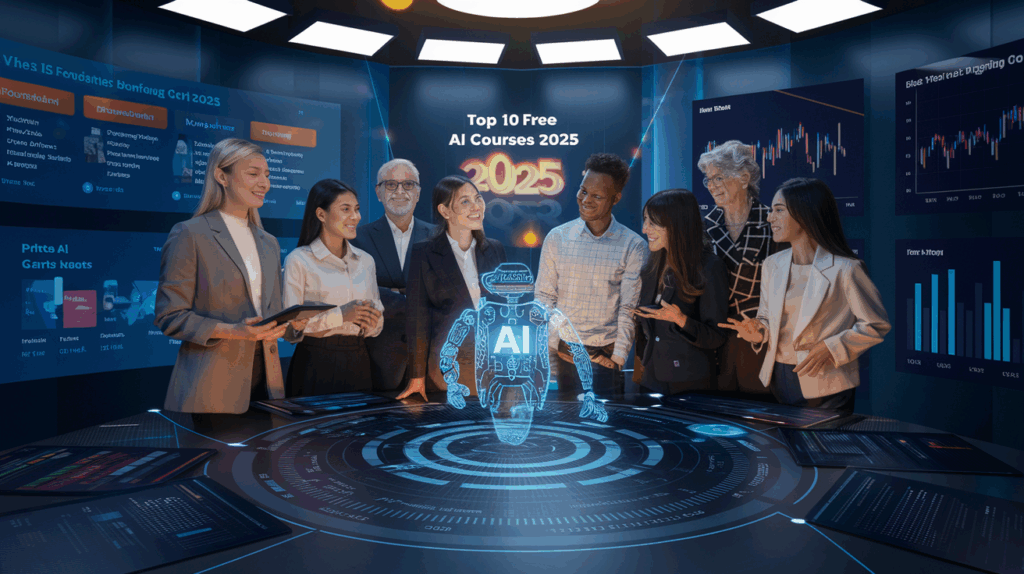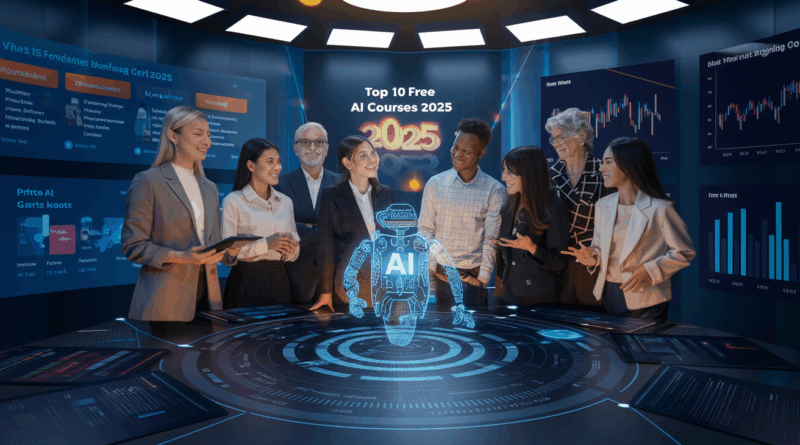Top 10 Free AI Courses to Take in 2025
Are you prepared for the AI revolution that’s reshaping careers across every industry? As the Generative AI market explodes from $13 billion to over $22 billion by 2025, professionals who don’t adapt risk being left behind. The good news? Tech giants like Amazon, Google, Microsoft, LinkedIn, and OpenAI are democratizing AI education by offering
completely free courses designed for everyone from technical developers to business professionals.
Whether you’re looking to understand the difference between traditional AI and creative Generative AI capabilities, master prompt engineering techniques, or implement ethical AI solutions in your organization, there’s a free course waiting for you. 💡 The right AI skills could not only transform your effectiveness at work but potentially lead to significant salary increases. With a structured learning plan and the right resources, you can position yourself at the
forefront of technological innovation in 2025.
In this guide, we’ll explore the current AI landscape, help you create a personalized learning action plan, and unveil the top free AI courses from industry leaders that cater to various professional backgrounds and essential AI competencies. Let’s embark on this journey to future-proof your career through accessible, high-quality AI education.
Understanding the AI Landscape in 2025

The Growth of Generative AI Market ($13B to $22B)
The AI market is exploding right now, and generative AI is the rocket fuel. We’re watching the market zoom from $13 billion to an expected $22 billion in 2025. That’s not just growth—that’s a revolution happening in real time.
Companies aren’t just dipping their toes in anymore; they’re diving headfirst into generative AI investments. Why? Because the ROI is becoming impossible to ignore. Organizations implementing these technologies are seeing productivity boosts of 30-40% in creative and analytical tasks.
Difference Between Traditional AI and Generative AI
Traditional AI and generative AI are cousins, but they’re hardly twins:
| Traditional AI |
Generative AI |
| Follows rules and patterns |
Creates new content from scratch |
| Good at classification and prediction |
Excels at producing text, images, code |
| Needs structured data |
Can work with unstructured inputs |
| Reactive and analytical |
Creative and innovative |
The big shift? Traditional AI tells you what IS. Generative AI shows you what COULD BE.
Why AI Skills Are Essential for Career Advancement
Your career in 2025 without AI skills is like showing up to a race with a bicycle when everyone else has rockets.
The numbers speak for themselves: professionals with AI skills are commanding 20-40% higher salaries across industries. But it’s not just about the money.
AI skills are becoming the new literacy. From marketing to healthcare to finance, every industry is being reshaped. Companies aren’t asking IF you know AI anymore—they’re asking HOW WELL.
The most in-demand skills? Prompt engineering, AI integration, and ethical AI implementation are topping the charts. And guess what? They’re all learnable through the free courses we’ll explore in this post.
Creating Your AI Learning Action Plan

Assessing Your Current Role and AI Opportunities
Look around your workplace. Where’s AI already showing up? Maybe it’s automating customer service or analyzing data faster than your team ever could. That’s your starting point.
Most careers aren’t disappearing—they’re transforming. The smart move is figuring out where AI intersects with your specific role.
Ask yourself:
- What repetitive tasks eat up my day?
- Which decisions would be easier with better data insights?
- How are competitors in my industry using AI?
Don’t overthink this step. Just jot down 3-5 areas where AI could either threaten your position or make you significantly more valuable.
Identifying Core Skills for Improvement
AI courses aren’t one-size-fits-all. The skills you need depend entirely on your goals.
For non-technical roles, focus on:
- AI literacy (understanding what’s possible)
- Prompt engineering (getting AI tools to deliver useful outputs)
- Critical thinking about AI-generated content
Technical folks should prioritize:
- Python basics
- Data preparation fundamentals
- Model selection and evaluation
Pick just two skills to start. Mastering something specific beats surface-level knowledge of everything.
Setting Realistic Deadlines and Accountability Measures
The brutal truth? Most online courses have completion rates under 10%. Don’t be another statistic.
Break your learning into weekly chunks—not monthly goals. Small wins create momentum.
Try this framework:
- Schedule 2-3 specific time blocks weekly (30-60 minutes each)
- Find a learning buddy taking the same course
- Create a mini-project applying each new skill to your actual work
- Share progress on LinkedIn or with your manager
The difference between wishing you knew AI and actually mastering it comes down to this planning stage. Don’t skip it.
Top Free AI Courses from Tech Giants

Amazon’s Introduction to Generative Artificial Intelligence
Looking to dive into AI without spending a dime? Amazon’s got you covered. Their free course breaks down generative AI in a way that won’t make your head spin. You’ll learn the core concepts behind models like GPT and DALL-E without drowning in technical jargon.
What makes this course stand out is how it connects theory to real-world applications. They show you exactly how businesses are using these tools today. Plus, you’ll get hands-on experience with Amazon Bedrock, their AI service that lets you play with different foundation models.
The course takes just about 3 hours to complete – perfect for a Sunday afternoon. By the end, you’ll actually understand what terms like “prompt engineering” and “fine-tuning” mean.
Microsoft’s Career Essentials in Generative AI
Microsoft didn’t come to play with their free AI offering. Their course is built for people who want AI skills that employers are actually looking for in 2025.
The genius of this course is how it walks you through Microsoft’s Azure AI tools while teaching you the fundamentals. You’ll create your own AI-powered apps and solutions without needing a PhD in computer science.
What you’ll really appreciate is how they’ve structured the learning path – from basic concepts to building your own projects. The course includes real certification opportunities that look pretty darn good on your LinkedIn profile.
Google, LinkedIn and OpenAI Offerings
Google’s AI course focuses on practical skills with TensorFlow. The assignments are challenging but totally doable, and you’ll walk away knowing how to implement actual machine learning models.
LinkedIn Learning offers a more business-focused approach. Their free AI courses help you understand how to apply AI to marketing, product development, and customer service. Perfect if you’re looking to level up your current career rather than switch fields entirely.
OpenAI’s offerings are surprisingly accessible for beginners. Their documentation reads more like a friendly tutorial than technical specs. They’ve got great examples showing how to use GPT models for different tasks – from content creation to coding assistance.
Courses for Different Professional Backgrounds

Options for Technical Professionals and Developers
Ever wondered which AI courses would actually boost your coding skills? If you’re already comfortable with Python or other programming languages, you’ll love these options.
Google’s Deep Learning specialization on Coursera is a game-changer. It dives straight into neural networks and TensorFlow implementation – no fluff, just the technical meat you need.
For those who prefer hands-on learning, Fast.ai’s “Practical Deep Learning for Coders” is ridiculously good. They flip the traditional approach by having you build working models first, then explaining the theory after you’ve seen results.
GitHub’s AI coding assistant course is another hidden gem. It specifically teaches you how to integrate AI tools into your development workflow – something surprisingly missing from many curriculums.
Courses for Business and Non-Technical Roles
Don’t know Python? No problem.
Andrew Ng’s “AI for Everyone” is the perfect no-code introduction that focuses on the strategic implications of AI rather than implementation. You’ll learn to identify AI opportunities in your business without writing a single line of code.
Coursera’s “AI Business Strategies” is another standout that walks you through real business cases where AI transformed operations. The course includes templates for AI project proposals you can adapt for your organization.
HubSpot Academy offers a free “AI for Marketers” course that specifically addresses how non-technical marketing professionals can leverage AI tools like ChatGPT for content creation and campaign optimization.
Specialized Tracks for Different Industry Needs
The healthcare industry has specific AI needs, and Stanford’s “AI in Medicine” certification addresses them perfectly. It covers everything from medical image analysis to ethical considerations unique to healthcare.
For finance professionals, NYU’s “AI for Trading” provides specialized content on algorithmic trading strategies and risk assessment models.
Creative professionals aren’t left out either. Domestika’s “AI for Designers” course specifically teaches artists and designers how to use AI as a creative partner rather than a replacement.
Essential AI Topics Covered in Free Courses

AI Fundamentals and Core Concepts
Free AI courses don’t skimp on the fundamentals. They dive right into machine learning algorithms, neural networks, and data preprocessing techniques that form the backbone of AI systems.
Most courses start with the difference between supervised and unsupervised learning – basically whether your AI has answer keys to learn from or needs to figure things out on its own. You’ll explore decision trees, which are exactly what they sound like: flowcharts that help machines make decisions.
Deep learning gets special attention because it’s powering most of today’s AI breakthroughs. You’ll learn about those mysterious neural networks – layers of math that somehow mimic how our brains process information.
The math part? It’s there, but the good courses break down linear algebra and statistics so even math-phobes can follow along.
Generative AI Applications and Use Cases
This is where courses get exciting. You’ll discover how generative AI creates brand new content – text, images, music – that never existed before.
Current courses cover ChatGPT, DALL-E, and Midjourney – tools that are reshaping creative industries overnight. You’ll see real examples of AI writing marketing copy, generating product designs, and coding entire websites from simple prompts.
Healthcare applications get lots of attention too – how AI detects diseases earlier than human doctors and generates treatment plans tailored to individual patients.
Prompt Engineering Techniques and Best Practices
The secret sauce behind great AI outputs? Well-crafted prompts.
Free courses now teach you how to structure your requests to get exactly what you want from AI systems. You’ll learn techniques like chain-of-thought prompting that guides AI through complex reasoning steps.
You’ll practice crafting prompts with specific constraints, like “Write this in the style of Shakespeare” or “Explain quantum computing to a 10-year-old.”
These courses also cover prompt pitfalls – like how being too vague leads to mediocre results, or how over-constraining can confuse the AI completely.
Ethical Considerations in AI Education

Responsible AI Development and Deployment
When you dive into AI courses, you’ll notice something crucial – ethics isn’t just a side topic anymore. It’s front and center.
The best AI courses now teach you not just how to build AI systems, but how to build them responsibly. This means understanding the potential impacts of what you create before you unleash it on the world.
What does responsible AI actually look like? It’s about asking tough questions during development: Who might this harm? What are the worst-case scenarios? Could this be misused?
Many free courses now include dedicated modules on ethical frameworks and governance models that help developers navigate these murky waters.
Addressing Bias and Fairness in AI Systems
Your AI is only as unbiased as your data and your awareness.
AI bias isn’t theoretical – it’s real and happening everywhere. From hiring algorithms that favor certain demographics to facial recognition that works better for some skin tones than others.
Quality AI education now teaches you to:
- Audit your training data for hidden biases
- Test systems across diverse user groups
- Implement fairness metrics in your evaluation process
The best part? These skills make you more valuable as an AI practitioner, not less.
Privacy and Security Implications
AI systems are data-hungry beasts. But with great data comes great responsibility.
Top AI courses now cover essential privacy concepts like:
- Data minimization techniques
- Differential privacy methods
- Secure model deployment
Understanding security vulnerabilities unique to AI (like adversarial attacks) isn’t optional knowledge anymore – it’s becoming a basic requirement for anyone working in the field.
Maximizing the Benefits of Free AI Learning

Building a Professional Network of AI Enthusiasts
Jumping into AI learning without connecting with others is like trying to climb Everest solo – technically possible but way harder than it needs to be.
Start by joining AI communities on Discord, Reddit, and LinkedIn groups focused on artificial intelligence. These aren’t just places to share memes (though that happens too) – they’re goldmines for troubleshooting, inspiration, and job leads.
When you take these free courses, don’t ghost after completion. Reach out to classmates through discussion forums. A simple “Hey, I loved your project on neural networks” can spark a meaningful connection.
Attend virtual AI meetups and hackathons. Nothing bonds people faster than debugging code at 3 AM or celebrating when your model finally works.
Applying New AI Skills to Real-World Projects
Free courses give you knowledge. Projects give you credibility.
Start small. See a problem in your daily life? Try solving it with AI. Maybe it’s sorting your photos automatically or predicting when your houseplants need water.
GitHub is your best friend here. Create repositories for your projects, no matter how basic. Future employers care more about seeing your work process than perfect code.
Contribute to open-source AI projects. It’s like having senior developers review your work for free.
Documenting Your Learning Journey
The best AI practitioners don’t just learn – they track their growth.
Start a tech blog or YouTube channel. Explaining concepts to others cements your understanding and builds your personal brand simultaneously.
Create a learning portfolio showing before/after examples of your skills. Include failed attempts too – they show how you overcome challenges.
Keep a decision journal for AI projects. Document why you chose certain algorithms or approaches. This shows critical thinking that free certificates alone can’t prove.
Potential Career Impact of AI Upskilling

Salary Enhancement Opportunities
The financial upside of AI skills? It’s massive.
Companies are practically throwing money at professionals who understand AI systems. We’re talking serious premium pay here. Data from 2024 shows AI specialists earning 30-40% more than their non-AI counterparts in the same fields.
Think about it: a regular software developer might make $85K, but add AI expertise? That jumps to $120K+. Same job title, drastically different paycheck.
What’s driving this? Simple supply and demand. Everyone wants AI talent, but there aren’t enough qualified people to fill those roles.
New Career Paths Enabled by AI Expertise
AI skills don’t just boost your current career—they can completely transform it.
Roles that didn’t exist five years ago are now the hottest tickets in town:
- AI Ethics Consultant
- Machine Learning Operations Engineer
- AI-Human Interaction Designer
- Prompt Engineering Specialist
The beauty here? Many of these new paths don’t require a complete career restart. Your existing industry knowledge combined with AI skills creates a unique value proposition employers can’t resist.
Positioning Yourself at the Forefront of Innovation
Being AI-savvy puts you in the driver’s seat of change rather than being swept along by it.
When your company faces that critical “how do we implement AI?” moment, guess who becomes invaluable? The person who already understands the landscape. That’s career insurance you can’t buy.
And it’s not just about job security. The real winners are those who can identify AI opportunities others miss. The ability to say “Here’s how we could use generative AI to solve this problem” makes you the innovation hero every organization desperately needs right now.

The AI revolution is not slowing down, with the Generative AI market alone projected to grow from $13 billion to over $22 billion by 2025. By leveraging the free courses offered by tech giants like Amazon, Google, Microsoft, LinkedIn, and OpenAI, you can position yourself at the forefront of this technological transformation. Whether you’re a developer looking to master AI fundamentals or a business professional seeking to understand generative applications, there’s a course tailored to your needs.
The democratization of AI education represents a unique opportunity to enhance your career prospects. By creating a structured learning action plan, identifying AI applications relevant to your role, and maintaining accountability through networking with like-minded professionals, you’re setting yourself up for success. Don’t wait to embrace the growth mindset necessary for today’s rapidly evolving technological landscape. Choose one of these courses today and take the first step toward not only expanding your skill set but potentially increasing your market value in an AI-driven future.










 The AI revolution is not slowing down, with the Generative AI market alone projected to grow from $13 billion to over $22 billion by 2025. By leveraging the free courses offered by tech giants like Amazon, Google, Microsoft, LinkedIn, and OpenAI, you can position yourself at the forefront of this technological transformation. Whether you’re a developer looking to master AI fundamentals or a business professional seeking to understand generative applications, there’s a course tailored to your needs.
The democratization of AI education represents a unique opportunity to enhance your career prospects. By creating a structured learning action plan, identifying AI applications relevant to your role, and maintaining accountability through networking with like-minded professionals, you’re setting yourself up for success. Don’t wait to embrace the growth mindset necessary for today’s rapidly evolving technological landscape. Choose one of these courses today and take the first step toward not only expanding your skill set but potentially increasing your market value in an AI-driven future.
The AI revolution is not slowing down, with the Generative AI market alone projected to grow from $13 billion to over $22 billion by 2025. By leveraging the free courses offered by tech giants like Amazon, Google, Microsoft, LinkedIn, and OpenAI, you can position yourself at the forefront of this technological transformation. Whether you’re a developer looking to master AI fundamentals or a business professional seeking to understand generative applications, there’s a course tailored to your needs.
The democratization of AI education represents a unique opportunity to enhance your career prospects. By creating a structured learning action plan, identifying AI applications relevant to your role, and maintaining accountability through networking with like-minded professionals, you’re setting yourself up for success. Don’t wait to embrace the growth mindset necessary for today’s rapidly evolving technological landscape. Choose one of these courses today and take the first step toward not only expanding your skill set but potentially increasing your market value in an AI-driven future.





